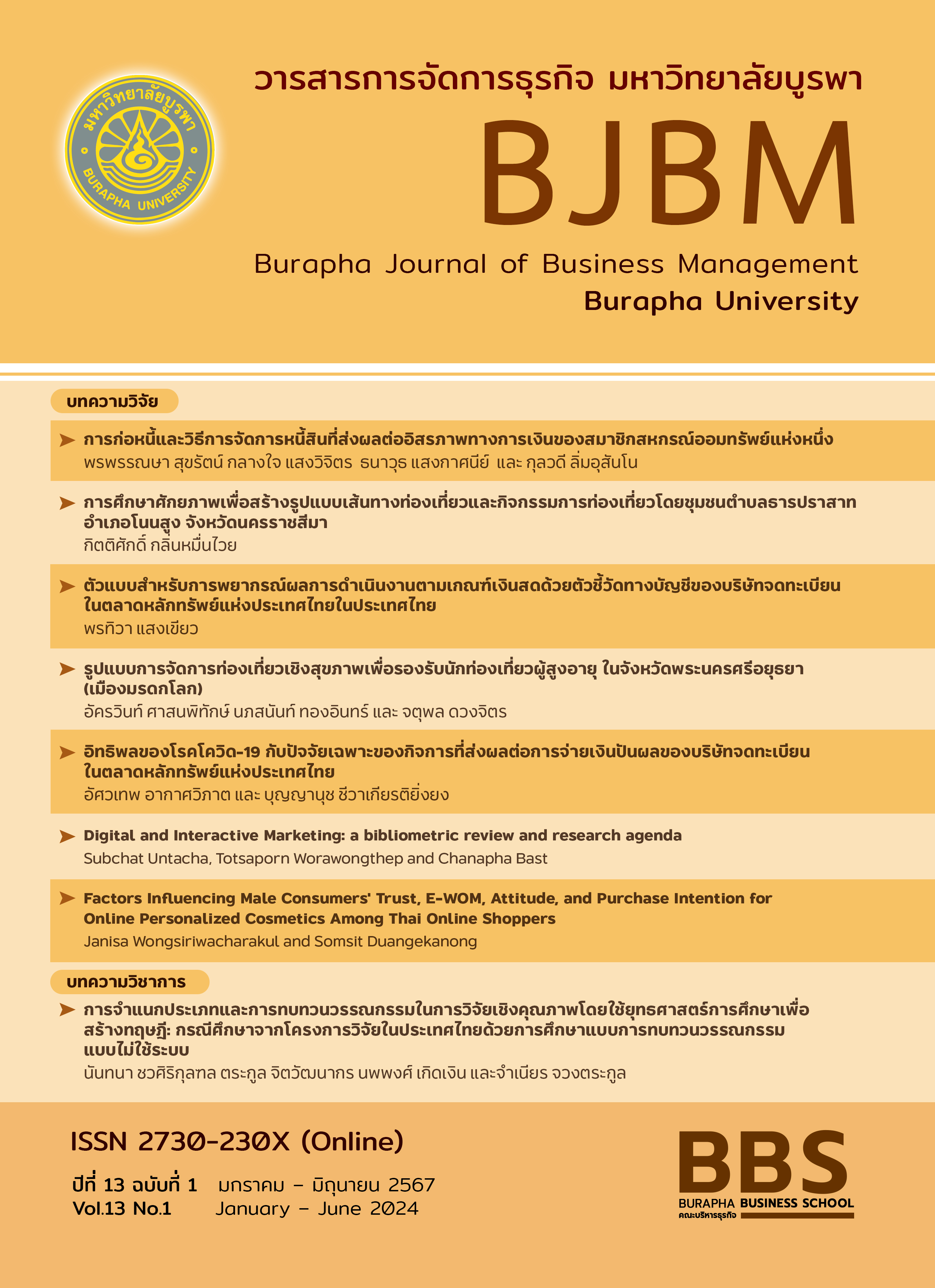การศึกษาศักยภาพเพื่อสร้างรูปแบบเส้นทางท่องเที่ยวและกิจกรรมการท่องเที่ยว โดยชุมชน ตำบลธารปราสาท อำเภอโนนสูง จังหวัดนครราชสีมา
Main Article Content
บทคัดย่อ
การวิจัยนี้มีวัตถุประสงค์ 1) เพื่อศึกษาศักยภาพการท่องเที่ยวโดยชุมชน และ 2) เพื่อสร้างรูปแบบเส้นทางท่องเที่ยวและกิจกรรมการท่องเที่ยวโดยชุมชนตำบลธารปราสาท อำเภอโนนสูง จังหวัดนครราชสีมา เป็นการวิจัยเชิงปฏิบัติการแบบมีส่วนร่วม(Participatory Action Research: PAR) กลุ่มตัวอย่าง คือ นักท่องเที่ยวและประชาชนในชุมชนตำบลธารปราสาท จำนวน 400 คน เครื่องมือวิจัย คือ แบบสอบถามเพื่อถามนักท่องเที่ยวและประชาชน โดยการเก็บข้อมูลแบบสะดวก และแบบสัมภาษณ์เชิงลึกเพื่อสัมภาษณ์กลุ่มผู้นำชุมชน ซึ่งเป็นผู้ที่สามารถให้ข้อมูลเชิงลึกและระดับนโยบายในการพัฒนาและส่งเสริมการท่องเที่ยวโดยชุมชนตำบลธารปราสาท จำนวน 12 คน โดยผ่านกิจกรรมการเสวนากลุ่มย่อย และวิเคราะห์ข้อมูลโดยใช้สถิติพรรณนาเพื่อหาค่าร้อยละ ค่าเฉลี่ย ส่วนเบี่ยงเบนมาตรฐานรวมถึงการวิเคราะห์เนื้อหา ผลการวิจัย พบว่าศักยภาพด้านการท่องเที่ยวโดยชุมชนตำบลธารปราสาท อำเภอโนนสูง จังหวัดนครราชสีมา โดยรวมทั้ง 7 ด้านมีศักยภาพอยู่ในระดับมาก โดยชุมชนมีส่วนร่วมในทุกภาคส่วนในการตัดสินใจ การกำหนดทิศทางการท่องเที่ยว และมีส่วนร่วมในการวางแผนดำเนินกิจกรรรมและสร้างรูปแบบเส้นทางการท่องเที่ยวโดยชุมชน และร่วมรับผลประโยชน์จากการท่องเที่ยวโดยชุมชน โดยเฉพาะทรัพยากรทางการท่องเที่ยวที่สำคัญทางแหล่งโบราณคดี ประวัติศาสตร์ วัฒนธรรมประเพณี วิถีชีวิตและภูมิปัญญาท้องถิ่นของชุมชนที่น่าสนใจ และการสร้างรูปแบบเส้นทางท่องเที่ยวและกิจกรรมการท่องเที่ยวโดยชุมชนตำบลธารปราสาท อำเภอโนนสูง จังหวัดนครราชสีมา ได้รูปแบบเส้นทางท่องเที่ยวและกิจกรรมการท่องเที่ยวโดยชุมชนจำนวน 2 เส้นทาง คือ เส้นทางที่ 1) เส้นทางการท่องเที่ยวเยือนอารยธรรมแหล่งโบราณคดี ไหว้ศาลปู่ตา เรียนรู้วิถีชีวิตชุมชนสืบสานภูมิปัญญาท้องถิ่น และ เส้นทางที่ 2) เส้นทางการท่องเที่ยวเยือนอารยธรรมแหล่งโบราณคดีคู่ลำน้ำธารปราสาท เรียนรู้วิถีถิ่นวิถีชุมชน
Article Details

อนุญาตภายใต้เงื่อนไข Creative Commons Attribution-NonCommercial-NoDerivatives 4.0 International License.
บทความที่จะตีพิมพ์เพื่อเผยแพร่ในวารสารการจัดการธุรกิจ มหาวิทยาลัยบูรพา จะต้องเป็นบทความที่ไม่เคยได้รับการตีพิมพ์เผยแพร่หรืออยู่ระหว่างการพิจารณาเพื่อตีพิมพ์เผยแพร่ในวารสารอื่น ๆ ทั้งนี้ หากพบว่ามีการละเมิดลิขสิทธิ์ ด้วยข้อคิดเห็นที่ปรากฏและแสดงในเนื้อหาบทความต่าง ๆ ให้ถือว่าเป็นความเห็นและความรับผิดชอบโดยตรงของผู้เขียนบทความนั้น ๆ มิใช่ความเห็นและความรับผิดชอบใด ๆ ของคณะบริหารธุรกิจ มหาวิทยาลัยบูรพา สำหรับในกรณีผู้ประสงค์จะนำข้อความในวารสารการจัดการธุรกิจ มหาวิทยาลัยบูรพา ไปเผยแพร่ต้องได้รับอนุญาตจากกองบรรณาธิการวารสารการจัดการธุรกิจ มหาวิทยาลัยบูรพา ตามกฎหมายว่าด้วยลิขสิทธิ์
เอกสารอ้างอิง
Aderhold, P. (2011). Community Based Tourism in Sustainable Tourism Development. Journal Great Potential with Risk/Contours (in focus), 21(2), 109-118.
Best, J. W., & J. V. Kahn. (1993). Research in Education. Boston: Allyn and Bacom.
Bonzanigo, L., Giupponi, C., & Balbi, S. (2016). Sustainable Tourism Planning and Climate Change Adaptation in the Alps: A Case Study of Winter Tourism in Mountain Communities in the Dolomites. Journal of Sustainable Tourism, 24(4), 637–652.
Buhalis, D. (2000). Marketing the Competitive Destination of The Future Marketing. Tourism Management, 21(1), 97-116.
Cheablam, O., & Rattanarat, J. (2019). Tourist Behavior and Satisfaction on Trips to Ban Thamsua Tourism Community, Krabi Province. WMS Journal of Management Walailak University, 8(4), 42-54.
Chuaybamrung, T. (2009). Roles of Local Government Organizations and Sustainable Tourism Development. Based on the Concept of Sufficiency Economy. Bangkok: Publishing House of the Cabinet and the Royal Gazette.
Community-Based Tourism Institute. (2018). Community Tourism Standards Manual. Chiang Mai: Wanida Printing.
Cooper, C., & Hall, M. (2013). Contemporary Tourism: An International Approach. (2nded.). Oxford: Goodfellow Publishers.
Cronbach, L. J. (1970). Essential of Psychological Testing. (5th ed.). New York: Harper and Row Publishers.
Department of Tourism. (2017). National Tourism Development Plan No.2 (2017-2021). Bangkok: The Veteran Aid Organization Printing Affairs Office.
Dodds, R., Ali, A., & Galaski, K. (2018). Mobilizing Knowledge: Determining Key Elements for Success and Pitfalls in Developing Community-Based Tourism. Current Issues in Tourism, 21(13), 1547-1568.
Jaiuea, M., Kulsiri, P., Ativetin, T., & Sirisuthikul, V. (2016). Marketing Model for Development of Bang Luang Community Cultural Heritage Tourism, Bang Luang Subdistrict, Bang Len District, Nakhon Pathom Province. Sripatum Chonburi Journal, 12(3), 12-24.
Jittangwatana, B., & Sridamka, P. (2014). Sustainable Tourism Development. (2nded.). Nonthaburi: Thammasarn Company.
Jittangwattana, B. (2012). Tourist Behavior. Nonthaburi: Fern Khor Luang Printing and Publishing.
Khongharn, R., Vadhanapakorn, W., & Katekaew, A. (2016). Service Model Development in Hotel Business for Foreign Retirees Tourists. Panyapiwat Journal, 8(3), 122-134.
Klinmuenwai, K. (2018). A study of tourism potential and creating community-basd Tourism Program Local guide of NaKrow Sub-district Municipality, Mae Tha District, Lampang Province. Thonburi University Academic Journal, 12(28), 85-97.
Likert, R. (1967). The Method of Constructing and Attitude Scale. Attitude Theory and Measurement. New York: Wiley & Son.
McIntosh, R. W., & Goeldner, C. R. (1986). Tourism Principles, Practices, Philosophies. New York: John Wiley & Son.
Nakhon Ratchasima Provincial Office. (2021). Basic information of Nakhon Ratchasima Province for the year 2021. Retrieved April 7, 2021, from https://www2.nakhonratchasima.go.th/ content/history_office.
Nakhon Ratchasima Provincial, Community Development Office. (2021). Minutes of the District Development Meeting No. 8/2021. Retrieved December 2, 2021, from https://korat.cdd.go.th /2021/08/27/news27086401.
Piandee, T., & Onlamai, W. (2021). Community-based Tourism Development Guidelines towards Responsible Green Tourism Destination: A Case Study of Ban Koh Khiam, Kantangtai Sub- district, Kantang District, Trang Province. Journal of Political Science Suan Sunandha Rajabhat University, 4(1), 24-38.
Pike, S. D. (2008). Destination Marketing: an integrated marketing communication approach. Massachusetts United States: Butterworth-Heinemann. Burlington.
Pitukpornpunlop, S., Somnuek, P. & Seehanam, N. (2565). Patterns of Creative Tourism Programs for Sam Phan Bok, Pho Sai District, Ubon Ratchathani Province. Journal of Humanities and Social Sciences, Rajapruk University, 8(1), 66-81.
Porananont, P. (2005). The Impact of The Tourism Industry. Chiang Mai: Faculty of Humanities Chiang Mai University.
Prahalad, C. K., & Ramaswamy, V. (2000). Co-opting Customer Competence. Harvard Business Review, 78(1), 79-87.
Praneetham, C., Charusirichai, N., & Mouepraman, A. (2020). Behavior of Thai tourists in selecting Accommodation in Muang District, Surat Thani Province. Journal of Kanchanaburi Rajabhat University, 8(1), 91-106.
Richards, G., & Raymond, C. (2000). Creative tourism. ATLAS News. 23, 16-20
Rout, P. C., & Gupta, S. K. (2017). Asset Based Community Development in Mountain Environs: A Strategic Application for Sustainable Community Based Tourism Development in The Jaunsar-Bawar Region of Uttarakhand, India. African Journal of Hospitality, Tourism andLeisure, 6(3), 1-11.
Saiyod, L., & Saiyod, A. (2010). Educational research techniques. (11thed.). Bangkok: Suwiriyasan.
Strydom, A. J., Mangope, D., & Henama, U. S. (2018). Lessons learned from Successful Community-Based Tourism Case Studies from the Global South. African Journal of Hospitality, Tourismand Leisure, 7(5), 1-13
Than Prasat Subdistrict Administrative Organization. (2022). General conditions and basic information, Than Prasat Subdistrict. Retrieved March 4, 2021, from https://www. thanprasat.go.th/public/list/data/index/menu/1142.
Thanawatphimol, S. (2021). President of Than Prasat Sub-district Administrative Organization. Interview, October 8, 2021.
Thanuphol, N. (2000). Ecotourism Business Development in Ban Pong Community, Pa Phai Sub-district, San Sai District. Chiang Mai Province (Research Report). Mae Jo University.
Thongma, W. (2018). Community Based Tourism (CBT) for development. Quality of life of communities in the forest land area. Bangkok: Department of National Parks, Wildlife and Plant Conservation.
Tourism Authority of Thailand. (2021). Conditions and situations of tourism in the future. Annual Report 2021. Retrieved October 8, 2021, from https://citly.me/UHa2K.
Whyte, B., Hood, T., & Brian, P. W. (2012). Cultural and Heritage Tourism: A Handbook for Community Champions. Ontario, Canada: Ministry of Culture and Heritage.
Wongwanich, W. (2006). Expectations and Satisfaction of Conservative Tourists. Bangkok: Thammasat University Press.
Yamane, T. (1973). Statistics: An Introductory Analysis. (3rded). New York: Harper and Row Publications.
Zapata, M. J., Hall, C. M., Lindo, P., & Vanderschaeghe, M. (2011). Can Community-Based Tourism contribute to Development and Poverty Alleviation? Lessons from Nicaragua. Current Issues in Tourism, 14(8), 725-749.


